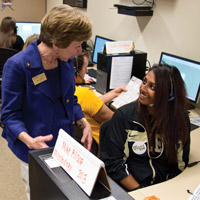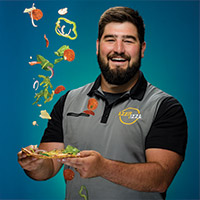RETHINKING TEACHING
HOW HHS PROFESSORS ARE USING NEW TOOLS AND CLASSROOM STRATEGIES TO DELIVER HIGHER EDUCATION
Blackboard learners

Blackboard Teachers: Janet Thorlton, assistant professor of nursing, and Jonathon Day, assistant professor of hospitality and tourism management, use Blackboard Learn to enhance the in-class experience with an online component. (Photo by Mark Simons)
Like Hotseat, which was developed by Information Technology at Purdue, Blackboard Learn allows professors to structure courses and deliver the content in an online environment. Students may meet for live lectures, as they do in Thorlton's Clinical Applications of Pathophysiology class, so the online component becomes supporting material.
Thorlton, assistant professor of nursing, is able to offer multiple tools to convey the complex content of pathophysiology. For example, Blackboard Learn allows her to develop learning modules and embed illustrations and YouTube videos in her course materials. Group assignments, discussion boards and social media integration have all helped to develop a learning community — even if it's online.
As Thorlton helps prepare students to become registered nurses, Blackboard Learn lets her track their progress along the way. "With date and time stamps of student activity, I can easily run a log report to see who's spending the time they need to with the online material," she says.
With an undergrad and a grad class, each with about 50 students, Thorlton divides the 50 into groups of six to eight. "It's crucial that nursing students fully understand how insulin works," she says, "so this makes for an ideal online discussion topic in smaller groups."
Among her graduate students in her Health Policy: Local to Global course, Thorlton has a wide range of students with different work and life experiences, from nurses with minimal experience to those with more than 30 years of experience. She's divided those students into special interest groups and they can post drafts of papers and offer peer critiques. "It's been one of the most successful classes I've ever taught," she says, as some of her more mature students take on a natural mentoring role.
Day, assistant professor of hospitality and tourism management, came to academia as a natural progression from a successful career in destination marketing, earning his master's and a PhD along the way. He brings the industry experience to his classroom that his students crave.
In addition to the intuitive ease in which Blackboard Learn helps him organize his undergraduate and graduate classes, Day likes having the extras of the system, so class time can be focused on discussions. Rather than spending the class taking copious notes, students can get lecture notes online. He's also looking into putting some more self-guided lectures online.
"One of our challenges as teachers is to engage our students," Day says. "They're already using a variety of different media, both in class and online. Coming from the business side of things, I really appreciate the impact of social media tools. Teaching is more than a couple of hours of face time in the class. These tools allow us to continue the conversation outside of class."
And in the history of academic conversations, from dialogues between Socrates and Plato on what constitutes a virtuous life to cyber chats between Day and one of his hospitality and tourism students on the business of marketing, these are the exchanges that lead to learning.











